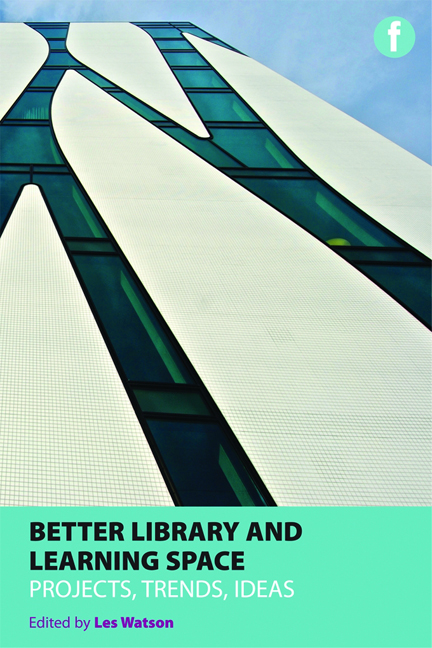Book contents
- Frontmatter
- Contents
- Case studies
- Acknowledgements
- Contributors
- Introduction – about this book
- PART 1 PROJECTS AND TRENDS
- PART 2 TRENDS AND IDEAS
- Introduction
- 7 Library space and technology
- 8 Library space and learning
- 9 Key ideas on space
- 10 Thinking it through
- Summary to Part 2
- PART 3 IDEAS AND FUTURES
- Index
Introduction
from PART 2 - TRENDS AND IDEAS
Published online by Cambridge University Press: 08 June 2018
- Frontmatter
- Contents
- Case studies
- Acknowledgements
- Contributors
- Introduction – about this book
- PART 1 PROJECTS AND TRENDS
- PART 2 TRENDS AND IDEAS
- Introduction
- 7 Library space and technology
- 8 Library space and learning
- 9 Key ideas on space
- 10 Thinking it through
- Summary to Part 2
- PART 3 IDEAS AND FUTURES
- Index
Summary
In this part there are four chapters, covering important aspects of the development of better library learning space. The importance of technology to the library was clearly evident in the case studies in Part 1, and this is discussed in Chapter 7. Technology is without doubt one of the most important factors to be considered in the development of new buildings and spaces. Because of its rapid developmental trajectory, it requires constant horizon scanning and some degree of risk taking in order to implement the most appropriate technology in a timely fashion. Chapter 7 looks at the relationship between the library and technology, what we really mean by rapid change, and suggests how technology should fit with overall strategy and what features technology-rich library space has today and may be like tomorrow.
In Chapter 8 aspects of literacy and learning that are most relevant to the development of the informal learning space commonly found in libraries are discussed, with an emphasis on the central importance of conversation to the construction of our knowledge and understanding. The growing acceptance of the importance of informal learning is considered as is societal change and the need for diversity, variety and flexibility of space provision.
Chapter 9 contains a range of ideas about space and the tangible and intangible factors that make it work well. Among these are the emotional impact of space and the importance of experiences. Open plan space is considered along with strategies such as zoning and the ideas of semiprivate space, balance of spaces and the flow between them.
The importance of intuitive approaches to library space and the professional insight of expert intuition in the planning of library learning space are discussed in Chapter 10. Other topics include imaginative approaches to the consultation process, evaluation processes and the importance of experimentation and modelling.
- Type
- Chapter
- Information
- Better Library and Learning SpaceProjects, trends and ideas, pp. 95 - 96Publisher: FacetPrint publication year: 2013
- 1
- Cited by



